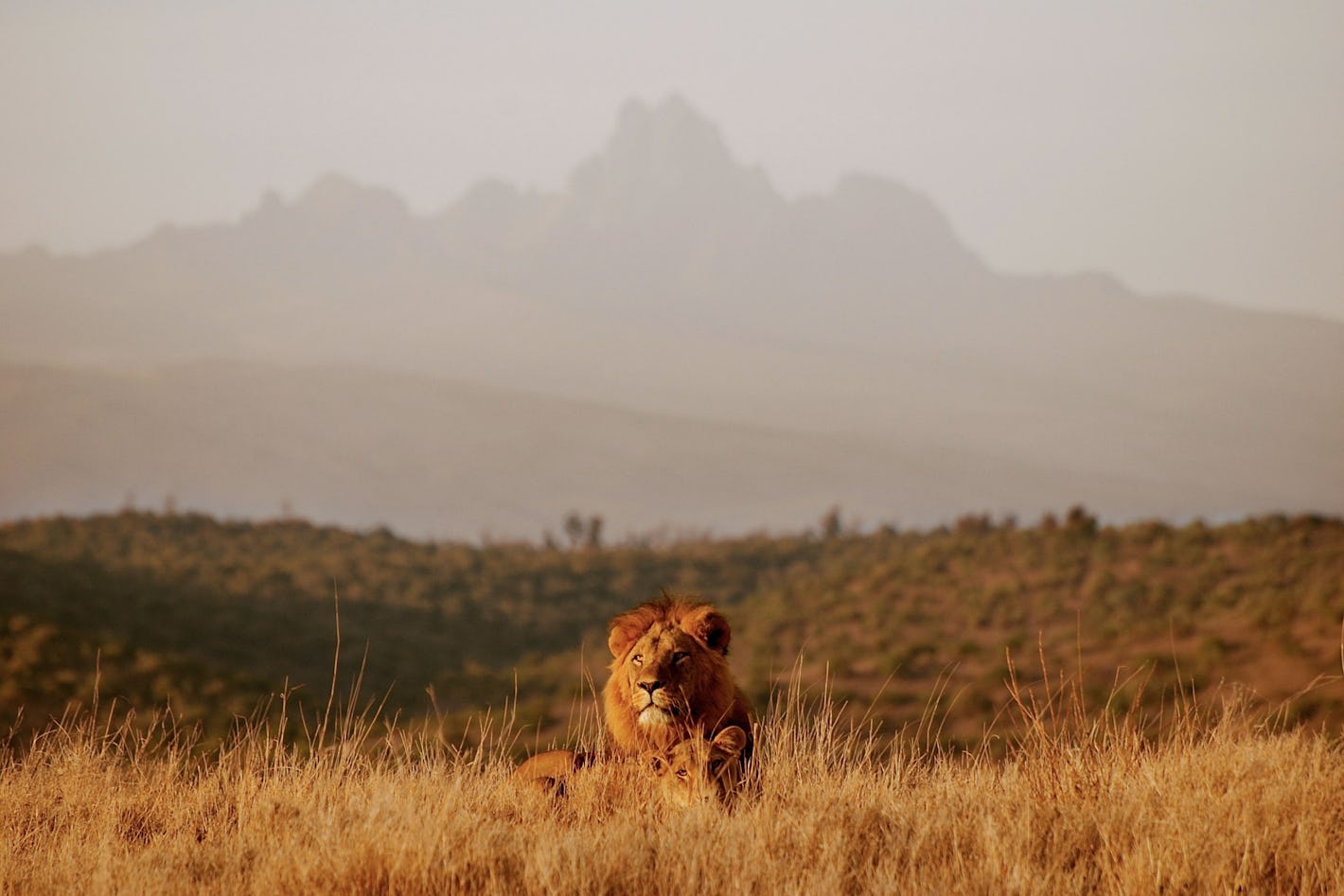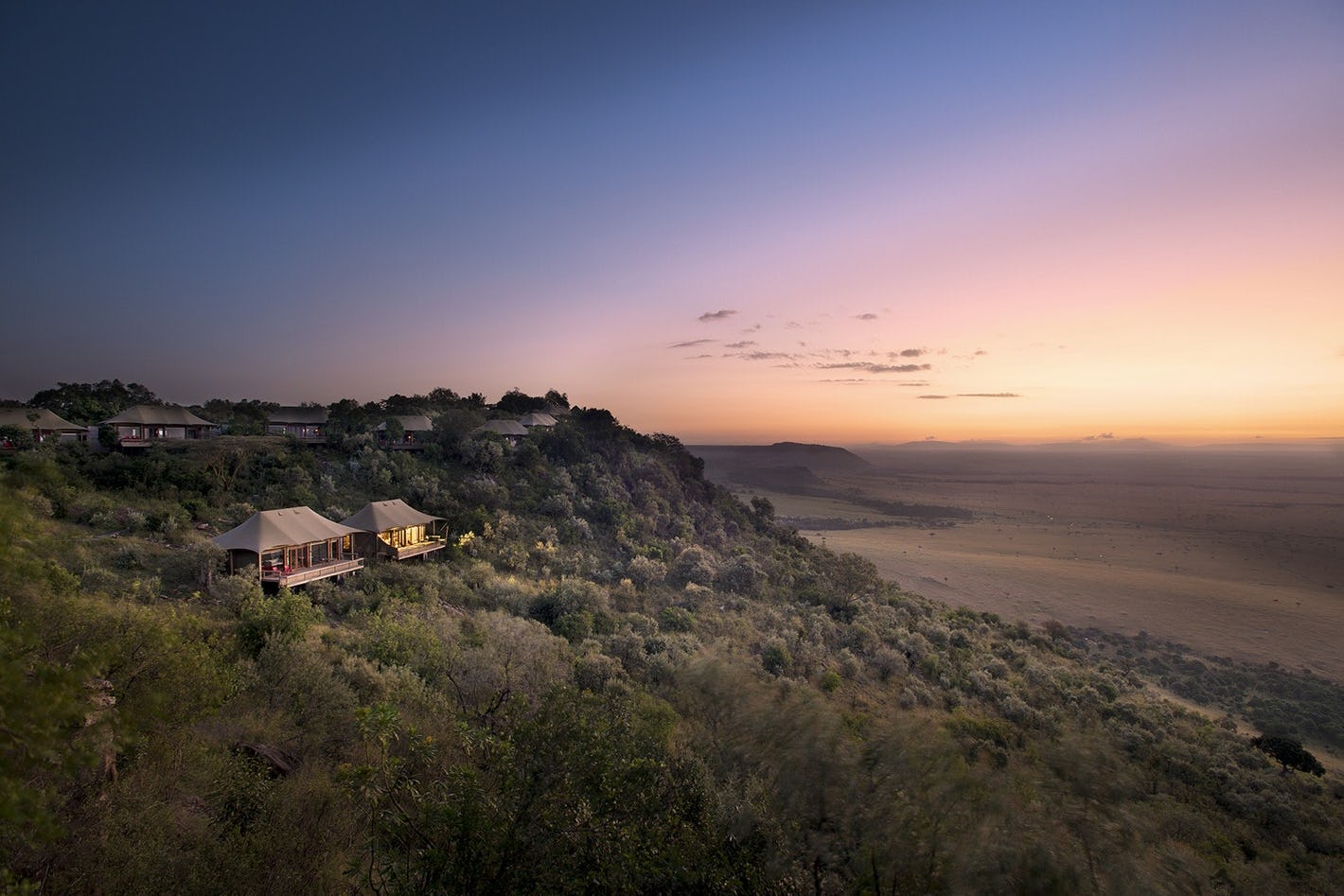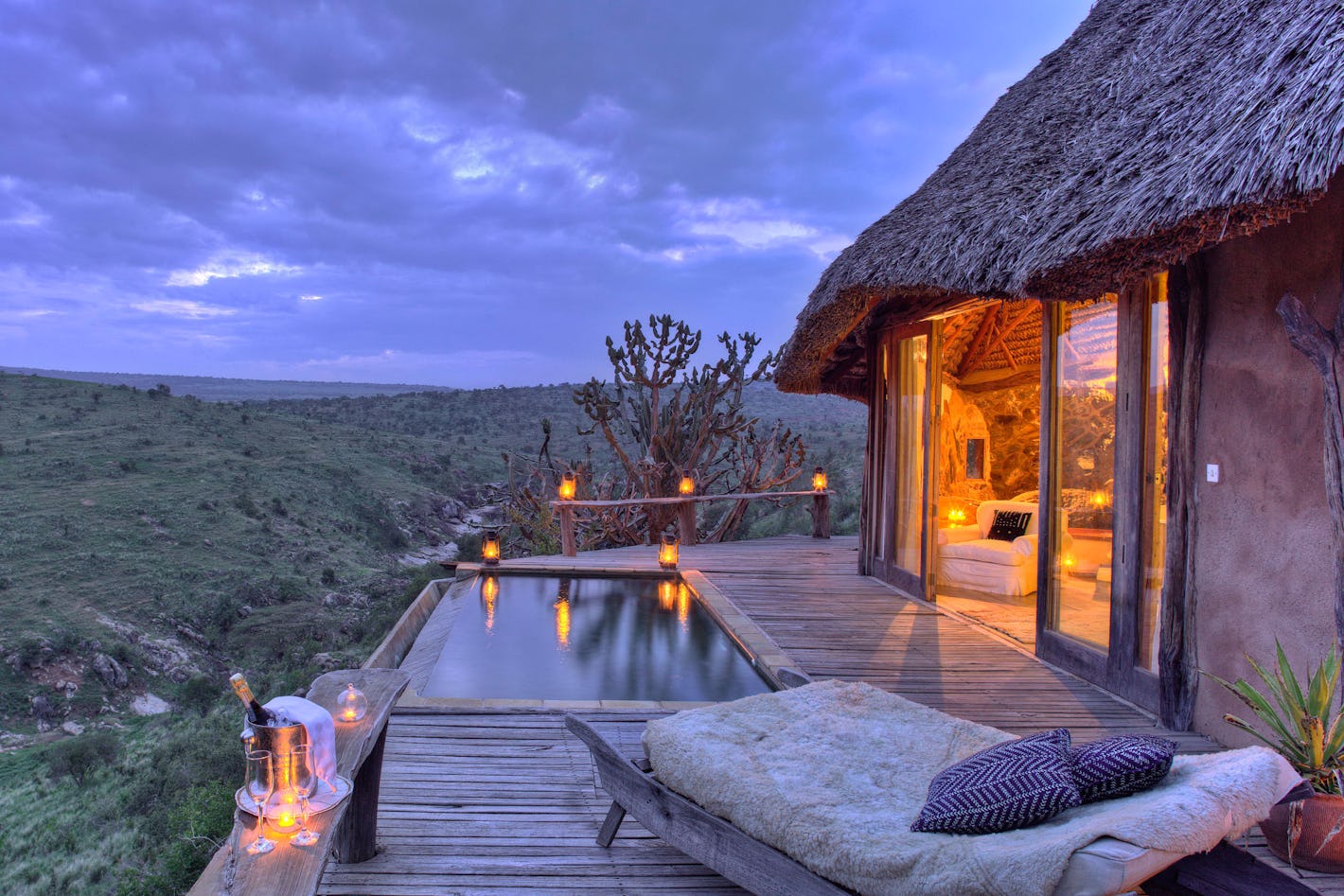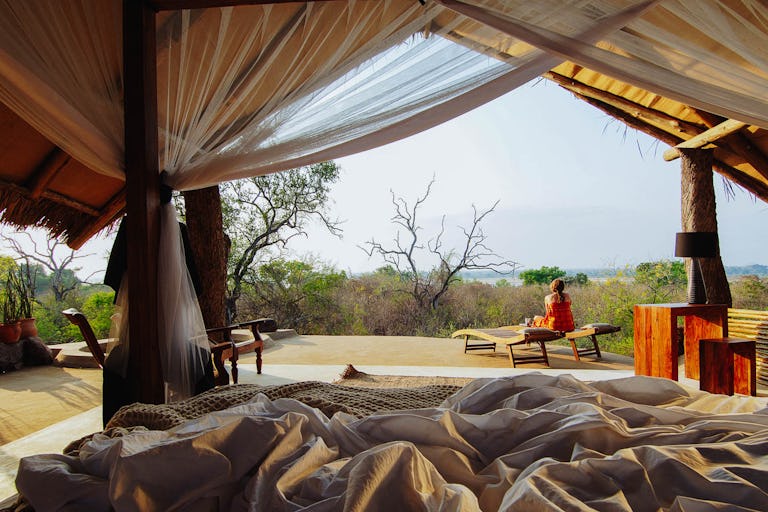
A classic safari destination with storybook scenery, Big Five safaris and colourful Maasai warriors.

Chat to an expert
Design your own trip
Customize one of our recommended trips or design your own from scratch

About Kenya
Kenya is the original safari destination. Home of the famous Masai Mara, the country has a decades-long history as the place to see the epic annual wildebeest migration. Sightings are certainly spectacular as the plains become flush with a moving melee of black ungulates, followed closely by lions and cheetahs who pick off the young and weak. Alternatively, a Kenyan safari could take you north to Samburu, with its arid thornveld and amazing leopard sightings, or to Amboseli, with its stunning views of Kilimanjaro, or even to the picture-perfect beaches on the Indian Ocean coast. We could send you to Kenya for months and you wouldn't be able to see it all.
Where to go in Kenya
Why you'll love it
Kenya is a traditional sort of place, and many of the lodges are still owner- or family-run, resulting in a charming safari that’s personal, a little bit different and all-round excellent. On safaris in Kenya, Africa comes alive and you won’t fail to fall in love with this mesmerising country again and again.
Off the beaten track
Head to Northern Kenya (Samburu and Mathew’s Range) for cultural experiences with a difference, exquisite walking safaris, fly camping and four-legged explorations on camel- and horseback.
Something to think about
Safari trips in Kenya are on many a wish list (and rightly so!), but it does mean that some of the more popular areas can become congested, particularly during the Great Migration.
Where to stay in Kenya
Luxury safari Kenya
While we love Africa at its rustic best, when it comes to a luxury safari, Kenya is the place to go. In Kenya, luxury safari lodges and camps are in no short supply and you'll find the likes of alfresco copper bathtubs, private sleep-out decks and state-of-the-art game vehicles. Have the full experience of being completely surrounded by nature, where wildlife pads past camp, whilst enjoying the perks of one of our luxury safaris in Kenya. As for making your trip that much more special, there are superb add-ons like a hot air balloon ride in the Masai Mara, a sunset dhow cruise off the coast or an evening spent at the coveted Giraffe Manor. And no luxury Kenya safari would be complete without a team of some of the continent's finest, who will see to every last detail including surprise breakfasts in the bush.
When to go on a Kenya safari
When it comes to a safari in Africa, Kenya does get busy, which means it can pay to be a little craftier with your visiting times. The July to October dry season is largely considered to be the best time to visit most areas, but August and September in particular can be extremely busy, especially in the Masai Mara as the herds of the Great Migration cross the river. Instead, look at visiting in October or November before the short rains begin for a quieter, more exclusive experience, or around Christmas and into January and February – this is before the long rains start in March and the days are clear, sunny and warm with excellent predator game viewing across the country. Often chosen as an ending to a safari, Kenya’s coast follows largely the same weather pattern as the rest of the country making it easy to plan a bush and beach escape too.
Wildlife in Kenya
Show all wildlife
Kenya is a country known for a rich diversity of wildlife spread across a range of habitats, both on land and in the in its tropical coastal waters. On Kenya safari tours, explore the majesty of the Masai Mara's great migration with all its predators, or the unique species of Samburu land in northern Kenya. Encounter the mighty Tuskers of the Amboseli backdropped by the picturesque Mount Kilimanjaro, and the endangered black rhino's of the Laikipia region. The coastal waters provide reef diving with tropical fish, turtles, whales, dolphins and more.
Kenya Safaris and Holidays - Need to know
Essential information before you leave
Getting to Kenya
Kenya has two international airports; Nairobi Jomo Kenyatta International Airport (NBO) and Mombasa Moi International Airport (MBA). There are various domestic airports and airfields connecting all major towns and destinations for Kenya safaris, and to other locations in Africa. Depending on your arrival time you may have to overnight before catching your connecting flight to your first safari camp the next day.
International flights
We would recommend booking your flights online in order to get the best rates. If you need any help or advice please let us know.
If you fly out of JFK Airport in New York, your approximate travel time to Nairobi will be 13 hours and 30 minutes.
A direct flight out of Heathrow will take just under 9 hours to reach Nairobi.
Domestic flights and transfers
Connecting between all the locations on your trip may necessitate a variety of modes: light aircraft charters, domestic commercial flights and road transfers. Please review the inclusions and exclusions on your specific trip page for details. If you need help understanding the best flights to book, please let us know.
From the moment that you land in Kenya you will be greeted and assisted to your onward connections. With our Kenya safari packages, you will be looked after from that point on until you are transferred back to the airport in time for your departure flight.
Health & Safety on a Kenya safari
Before any and all Kenya trips, we advise you to consult your personal physician and/or a travel clinic preferably 6 weeks prior to your departure. Vaccine requirements vary based on your country of origin and your travel itinerary, as well as your previous vaccination history. It is best to consult with your physician or the CDC website for guidelines.
Important vaccinations to consider and which may either be required or recommended are: Yellow Fever, Typhoid, Hepatitis A & B and Cholera, among others. Please always carry your "International Certificate of Vaccination or Prophylaxis (ICVP)" (or "Yellow Card") with you.
Malaria
We advise that you consult a medical practitioner at least six weeks prior to travel. Malaria is present in Kenya and it is strongly advisable to take malaria prophylactics before, during and after your visit. Please consult a medical professional regarding which prophylactics will be suitable for you.
In addition to the recommendations of your travel clinic or physician, you may also consider the following proactive preventative measures:
● Apply insect repellent to exposed skin. Recommended repellents contain 20-35% DEET but it is a very virulent repellent, and should be used cautiously.
● Wear long-sleeved clothing and long pants at dawn and dusk, as well as closed shoes.
● Use a mosquito net if your tent or room isn't screened or air-conditioned; and spray insecticide or burn a mosquito coil before going to bed.
If you come down with flu-like symptoms either during or within four to six weeks after your visit to a malaria area, seek a doctor's advice immediately and let him/her know that you have been in a malaria area.
You can also visit www.malaria.org.za for more information.
Yellow Fever
There is risk of Yellow Fever whilst on safari in Kenya; and, vaccination is required for travellers who are arriving from, or have transited through, countries with risk of Yellow Fever transmission (e.g. Uganda, Rwanda or elsewhere worldwide). It will also be required should you be carrying on to any regional countries without Yellow Fever (e.g. South Africa, Botswana, etc). This requirement can change unexpectedly, therefore, we recommend carrying a Yellow Fever card with you at all times.
Communication
Kenya country code: +254
Calling overseas from Kenya:
From a landline dial 00 followed by the country code plus area code and number.
e.g. USA: 00 1 910 795 1048
When calling from a cell phone dial + prefix followed by the country code plus area code and number. e.g. USA: + 1 910 795 1048
Money & Gratuities in Kenya
Money
The currency in Kenya is the Kenya Shilling (KSh). You can convert money to Shillings at a bank or Forex Bureau, or withdraw from an ATM, all found in the larger airports and towns. Please check with your bank for charges and advice when using international ATMs. VISA and Mastercard are the most widely accepted credit cards. American Express has limited to no coverage. It is advisable to have some cash for smaller shops and for tipping.
IMPORTANT: When bringing foreign currency (e.g. USD, GBP, EUR) into the country, be sure to have the new format with no damage or marks. For US Dollars only bank notes dated from 2009 and onwards will be accepted in Kenya.
Gratuities
Gratuities are not compulsory or expected on a trip to Kenya; rather it is a reward for excellent service. If you are pleased with the service you receive, you are more than welcome to tip your guide or the staff. Tipping is usually done at the end of your stay. You may tip the staff individually, give the tip to the manager to distribute, or do both. Tips can be made in Kenyan Shillings (KSh), USD, GBP or EUR.
Gratuity suggestions:
Safari camp or city lead guide: $15 - $20 per person per day
Transfer drivers (e.g. in cities or between the airport and hotel/lodge): $5 per person per transfer
Porter: $1 per bag
Ranger or any “ancillary” guides on an ad-hoc basis for a specific activity: $5 - $10 per person per activity
General camp staff (put in a central box in each camp’s main area): $10 - $15 per person per day
Waitstaff in a city restaurant: 10% - 15% (large group may incur automatic service charge - please check)
Travel Insurance for Kenya
Insurance
It is a condition of booking that you carry the correct comprehensive travel and medical insurance to cover yourself, as well as any dependents/travelling companions for the duration of your trip. This insurance should include cover in respect of, but not limited to, the following eventualities:
Compulsory Insurance:
a. Emergency evacuation expenses
b. Medical expenses
c. Repatriation expenses
Recommended Insurance:
a. Cancellation or curtailment of trip
b. Damage/theft/loss of personal luggage, money and goods
Kenya safari visas
As a general precaution, we recommend you make several copies of your travel-related documents (passport, traveller’s cheques, credit cards, itinerary, airline tickets, insurance cover, visas, etc). Leave one set at home, and bring another set with you, and place it in a location separate from your originals.
Kenya does not require travellers to apply for a visa but anyone entering Kenya is required to fill in an Electronic Travel Authorization form at https://www.etakenya.go.ke/enprior to arrival. Most African nationals are excluded from this.
Passports MUST be valid for at least six months (we recommend nine) from your departure from East Africa to home. There must be at least TWO consecutive blank VISA pages in the passport (not endorsement pages). All travellers requiring a visa will need to apply for an e-visa in advance and no visas will be issued on arrival. For more information visit www.evisa.go.ke
Please do contact the embassy or consultant in your home country to reconfirm visa requirements, as they change often. Visa Central is also a good resource for further information.
What to pack for a Kenya safari
Climate
Kenya offers warm days with cool mornings and evenings year-round, throughout most of the country. At higher altitudes, the temperatures are moderate and the coast is often humid and tropical. There are two primary rainy seasons: the long rains roughly from April to June and the short rains during October and November. Kenya can be visited year-round, but the climate varies hugely between the rainy and dry seasons.
Dress Code
Modest clothing is advisable in the bigger towns and cities in Kenya, however in the lodges and camps and on the beaches at the coast, it is perfectly fine to wear shorts and shirts or beach wear. Generally speaking, light layers of clothing in neutral safari colours of green, khaki and beige are the best items to bring with you on Kenyan safaris, as well as a warmer jacket or fleece for the colder evenings. A hat is also a must have! Dark colours such as navy or black can attract tstese fllies and are best avoided, as are bright colours like yellow, red and purple if you are going on safari.
What to Pack
Across the board, there is a selection of clothing and items that should be on your packing list when it comes to Kenya vacations. The below is a suggested list:
• Layers - long and short sleeve shirts and trousers
• A warm fleece or jumper
• A lightweight waterproof jacket
• Comfortable but sturdy shoes
• Flip-flops
• Swimming costume (Bathing suit)
• A hat or baseball cap
• Sunglasses
• Sunscreen – a must!
• Toiletries – most camps will provide shampoo, shower gel and soap
• A small torch
• Spare batteries, plug adaptors and charging equipment
• A good pair of Binoculars (8x40/8x42 is recommended)
• Books or a fully loaded Kindle / iPad for siesta time
Most camps and lodges will have a small medical and first aid kit, but we recommend bringing your own supply of essentials - cough medicine, plasters, vitamins, aspirin and paracetamol, and anything else you use on a regular basis.
Camera Equipment (for the enthusiasts)
• A telephoto lens (200/300mm)
• Flash and fast film (400 ASA) for night photography
• Lots of film (64,100,200,400 ASA) if using an SLR camera
• Spare memory cards for digital cameras
• Camera cleaning equipment and a good dust proof bag
• Bring spare batteries as although you may recharge your batteries at the camps, charging capacity can be limited
NB: Plastic bags are banned and carry a fine if brought into the country. Make sure you leave your bags on the airplane upon arrival.
Luggage
Please check with your airlines for the specific luggage restrictions relevant to your flight schedule. Many international airlines have a baggage allowance of 20kgs or more per person and commercial airlines generally permit two (2) pieces of checked luggage. The carry-on bag must be of such dimensions and weight as set by the airlines.
Luggage Restrictions on Internal Flights
Please be advised that on domestic flights, luggage is limited to one SOFT duffel bag per person with a maximum weight of 15kg/33lbs. No hardshell bags are permitted.
Electricity
Kenya uses 220/230V, 50Hz AC, and sockets take mostly Type G (3 prong large rectangular) and some Type C (2 prong narrow round). Most hotel rooms have sockets for 110V electric razors. Most of the safari camps have electricity points either in the main communal area or in each tent/room. It is best to bring an adapter/convertor combination.
Kenya in the blog
Kenya Safaris - Frequently asked questions
Are Kenya safaris worth it?
In a word, yes. While a safari can be one of the most expensive trips you can plan, the experience is truly worth the cost. However, there are ways of saving a few bucks on a Kenyan safari including travelling outside of peak season, staying longer at one property and picking accommodation just outside of the national parks.
What are the major attractions in Kenya?
The wildlife is superlative to say the least and you’ll have the chance to spot members of the Big Five on a safari in Kenya. Between July and November, catch the enthralling scenes of the Great Migration in the Masai Mara. Kenya has a gorgeous coastline, which makes the perfect end to a safari trip. Kenya is also home to incredible tribes, who offer insight into their way of life, the land and its four-legged residents.
How is the wildlife viewing in Kenya?
Kenya is one of the most prolific wildlife destinations on the planet and, no matter where in the country you choose to visit, there are incredible sightings to be had. Highlights on Kenya safaris include the Great Migration, the Big Five including the highly endangered rhino, endemic northern species, and dazzling birdlife.
What vaccinations do I need to go on safari in Kenya?
It is best to consult your personal physician preferably six weeks prior to your departure to ensure any necessary vaccinations are received. However, vaccinations that may be required or recommended before a trip to Kenya include Yellow Fever, Typhoid, Hepatitis A & B, and Cholera. Malaria prophylactics are also advisable to take.
What not to wear on a safari in Kenya?
It’s best to wear items in neutral colours like green, khaki and beige to remain unobtrusive to the wildlife. Dark colours like navy blue or black may attract tsetse flies and are best avoided, as well as bright colours like yellow, red and purple. On safari trips in Kenya, lightweight layers are recommended as opposed to heavy thermals or restrictive clothing.
How many days are needed for a Kenyan safari?
While this will depend on your budget and what you want to see, between a week and 10 days is the common length for a safari in Kenya. This will allow you time to settle into Nairobi, before visiting major destinations like the Masai Mara or Laikipia, then perhaps ending on the coast. Of course, your trip can be longer to include a few of Kenya’s lesser-known parks or spend additional days in one location.
What our guests are saying
Design your own trip
Choose a destination, pick your properties, and we'll do the rest
Design a tripNeed a hand?
hello@timbuktutravel.com +44 (0)203 8083 860 +1 (646) 542 0667 +27 (0)21 201 7253 Live chat
,url-https%3A%2F%2Fwaybird.imgix.net%2Fimages%2Fmap%2Fmarker_red_shadow.png%3Fw%3D44(37.536751,-2.572401),url-https%3A%2F%2Fwaybird.imgix.net%2Fimages%2Fmap%2Fmarker_red_shadow.png%3Fw%3D44(36.736904,0.406000),url-https%3A%2F%2Fwaybird.imgix.net%2Fimages%2Fmap%2Fmarker_red_shadow.png%3Fw%3D44(39.593997,-4.278925),url-https%3A%2F%2Fwaybird.imgix.net%2Fimages%2Fmap%2Fmarker_red_shadow.png%3Fw%3D44(37.542305,0.609381),url-https%3A%2F%2Fwaybird.imgix.net%2Fimages%2Fmap%2Fmarker_red_shadow.png%3Fw%3D44(39.464131,-4.480133),url-https%3A%2F%2Fwaybird.imgix.net%2Fimages%2Fmap%2Fmarker_red_shadow.png%3Fw%3D44(38.191093,0.124153),url-https%3A%2F%2Fwaybird.imgix.net%2Fimages%2Fmap%2Fmarker_red_shadow.png%3Fw%3D44(37.405704,0.220933),url-https%3A%2F%2Fwaybird.imgix.net%2Fimages%2Fmap%2Fmarker_red_shadow.png%3Fw%3D44(36.351958,-0.761329),url-https%3A%2F%2Fwaybird.imgix.net%2Fimages%2Fmap%2Fmarker_red_shadow.png%3Fw%3D44(36.822139,-1.293725),url-https%3A%2F%2Fwaybird.imgix.net%2Fimages%2Fmap%2Fmarker_red_shadow.png%3Fw%3D44(36.095272,-0.356655),url-https%3A%2F%2Fwaybird.imgix.net%2Fimages%2Fmap%2Fmarker_red_shadow.png%3Fw%3D44(40.858441,-2.279323),url-https%3A%2F%2Fwaybird.imgix.net%2Fimages%2Fmap%2Fmarker_red_shadow.png%3Fw%3D44(37.312849,1.287123),url-https%3A%2F%2Fwaybird.imgix.net%2Fimages%2Fmap%2Fmarker_red_shadow.png%3Fw%3D44(38.443093,-2.995284),url-https%3A%2F%2Fwaybird.imgix.net%2Fimages%2Fmap%2Fmarker_red_shadow.png%3Fw%3D44(37.307861,-0.152117),url-https%3A%2F%2Fwaybird.imgix.net%2Fimages%2Fmap%2Fmarker_red_shadow.png%3Fw%3D44(36.688532,-0.453980),url-https%3A%2F%2Fwaybird.imgix.net%2Fimages%2Fmap%2Fmarker_red_shadow.png%3Fw%3D44(36.562120,2.682732),url-https%3A%2F%2Fwaybird.imgix.net%2Fimages%2Fmap%2Fmarker_red_shadow.png%3Fw%3D44(39.658844,-4.035186)/auto/620x353@2x?access_token=pk.eyJ1IjoidGltYnVrdHV0cmF2ZWwiLCJhIjoiY2poMGw1eHpkMmRkbDJ6bW8xYWZ5OGpjYyJ9.PYvAO7lUJ40SOpGvwmQLqw&attribution=false&logo=false)
























,url-https%3A%2F%2Fwaybird.imgix.net%2Fimages%2Fmap%2Fmarker_yellow.png%3Fw%3D22(36.923886,-1.322705),url-https%3A%2F%2Fwaybird.imgix.net%2Fimages%2Fmap%2Fmarker_blue.png%3Fw%3D22(36.918046,-1.341462),url-https%3A%2F%2Fwaybird.imgix.net%2Fimages%2Fmap%2Fmarker_blue.png%3Fw%3D22(30.064840,-1.946951),url-https%3A%2F%2Fwaybird.imgix.net%2Fimages%2Fmap%2Fmarker_blue.png%3Fw%3D22(29.615676,-1.438784),url-https%3A%2F%2Fwaybird.imgix.net%2Fimages%2Fmap%2Fmarker_blue.png%3Fw%3D22(36.803516,-1.327864),url-https%3A%2F%2Fwaybird.imgix.net%2Fimages%2Fmap%2Fmarker_blue.png%3Fw%3D22(36.859929,-0.042587),url-https%3A%2F%2Fwaybird.imgix.net%2Fimages%2Fmap%2Fmarker_blue.png%3Fw%3D22(36.052233,-0.437849),url-https%3A%2F%2Fwaybird.imgix.net%2Fimages%2Fmap%2Fmarker_blue.png%3Fw%3D22(35.060199,-1.450359),url-https%3A%2F%2Fwaybird.imgix.net%2Fimages%2Fmap%2Fmarker_yellow.png%3Fw%3D22(36.923886,-1.322705)/auto/72x72@2x?access_token=pk.eyJ1IjoidGltYnVrdHV0cmF2ZWwiLCJhIjoiY2poMGw1eHpkMmRkbDJ6bW8xYWZ5OGpjYyJ9.PYvAO7lUJ40SOpGvwmQLqw&attribution=false&logo=false)
,url-https%3A%2F%2Fwaybird.imgix.net%2Fimages%2Fmap%2Fmarker_yellow.png%3Fw%3D22(25.837811,-18.094167),url-https%3A%2F%2Fwaybird.imgix.net%2Fimages%2Fmap%2Fmarker_blue.png%3Fw%3D22(25.818166,-17.927454),url-https%3A%2F%2Fwaybird.imgix.net%2Fimages%2Fmap%2Fmarker_blue.png%3Fw%3D22(26.483370,-18.871828),url-https%3A%2F%2Fwaybird.imgix.net%2Fimages%2Fmap%2Fmarker_blue.png%3Fw%3D22(27.461339,-19.078352),url-https%3A%2F%2Fwaybird.imgix.net%2Fimages%2Fmap%2Fmarker_yellow.png%3Fw%3D22(25.837811,-18.094167)/auto/72x72@2x?access_token=pk.eyJ1IjoidGltYnVrdHV0cmF2ZWwiLCJhIjoiY2poMGw1eHpkMmRkbDJ6bW8xYWZ5OGpjYyJ9.PYvAO7lUJ40SOpGvwmQLqw&attribution=false&logo=false)
,url-https%3A%2F%2Fwaybird.imgix.net%2Fimages%2Fmap%2Fmarker_yellow.png%3Fw%3D22(36.923886,-1.322705),url-https%3A%2F%2Fwaybird.imgix.net%2Fimages%2Fmap%2Fmarker_blue.png%3Fw%3D22(36.918046,-1.341462),url-https%3A%2F%2Fwaybird.imgix.net%2Fimages%2Fmap%2Fmarker_blue.png%3Fw%3D22(35.035357,-1.234536),url-https%3A%2F%2Fwaybird.imgix.net%2Fimages%2Fmap%2Fmarker_yellow.png%3Fw%3D22(36.923886,-1.322705)/auto/72x72@2x?access_token=pk.eyJ1IjoidGltYnVrdHV0cmF2ZWwiLCJhIjoiY2poMGw1eHpkMmRkbDJ6bW8xYWZ5OGpjYyJ9.PYvAO7lUJ40SOpGvwmQLqw&attribution=false&logo=false)
,url-https%3A%2F%2Fwaybird.imgix.net%2Fimages%2Fmap%2Fmarker_yellow.png%3Fw%3D22(32.436430,0.042443),url-https%3A%2F%2Fwaybird.imgix.net%2Fimages%2Fmap%2Fmarker_blue.png%3Fw%3D22(32.467550,0.055645),url-https%3A%2F%2Fwaybird.imgix.net%2Fimages%2Fmap%2Fmarker_blue.png%3Fw%3D22(31.573253,2.290126),url-https%3A%2F%2Fwaybird.imgix.net%2Fimages%2Fmap%2Fmarker_blue.png%3Fw%3D22(30.394046,0.431828),url-https%3A%2F%2Fwaybird.imgix.net%2Fimages%2Fmap%2Fmarker_blue.png%3Fw%3D22(29.899825,-0.188428),url-https%3A%2F%2Fwaybird.imgix.net%2Fimages%2Fmap%2Fmarker_blue.png%3Fw%3D22(29.711680,-0.619822),url-https%3A%2F%2Fwaybird.imgix.net%2Fimages%2Fmap%2Fmarker_blue.png%3Fw%3D22(29.616627,-0.986596),url-https%3A%2F%2Fwaybird.imgix.net%2Fimages%2Fmap%2Fmarker_yellow.png%3Fw%3D22(32.436430,0.042443)/auto/72x72@2x?access_token=pk.eyJ1IjoidGltYnVrdHV0cmF2ZWwiLCJhIjoiY2poMGw1eHpkMmRkbDJ6bW8xYWZ5OGpjYyJ9.PYvAO7lUJ40SOpGvwmQLqw&attribution=false&logo=false)
,url-https%3A%2F%2Fwaybird.imgix.net%2Fimages%2Fmap%2Fmarker_yellow.png%3Fw%3D22(36.923886,-1.322705),url-https%3A%2F%2Fwaybird.imgix.net%2Fimages%2Fmap%2Fmarker_blue.png%3Fw%3D22(36.702587,-1.341083),url-https%3A%2F%2Fwaybird.imgix.net%2Fimages%2Fmap%2Fmarker_blue.png%3Fw%3D22(36.982322,0.018325),url-https%3A%2F%2Fwaybird.imgix.net%2Fimages%2Fmap%2Fmarker_blue.png%3Fw%3D22(32.455046,0.035545),url-https%3A%2F%2Fwaybird.imgix.net%2Fimages%2Fmap%2Fmarker_blue.png%3Fw%3D22(29.614122,-0.997344),url-https%3A%2F%2Fwaybird.imgix.net%2Fimages%2Fmap%2Fmarker_yellow.png%3Fw%3D22(32.436430,0.042443)/auto/72x72@2x?access_token=pk.eyJ1IjoidGltYnVrdHV0cmF2ZWwiLCJhIjoiY2poMGw1eHpkMmRkbDJ6bW8xYWZ5OGpjYyJ9.PYvAO7lUJ40SOpGvwmQLqw&attribution=false&logo=false)
,url-https%3A%2F%2Fwaybird.imgix.net%2Fimages%2Fmap%2Fmarker_yellow.png%3Fw%3D22(30.135109,-1.963502),url-https%3A%2F%2Fwaybird.imgix.net%2Fimages%2Fmap%2Fmarker_blue.png%3Fw%3D22(30.064840,-1.946951),url-https%3A%2F%2Fwaybird.imgix.net%2Fimages%2Fmap%2Fmarker_blue.png%3Fw%3D22(29.537320,-1.415555),url-https%3A%2F%2Fwaybird.imgix.net%2Fimages%2Fmap%2Fmarker_blue.png%3Fw%3D22(35.123917,-2.557361),url-https%3A%2F%2Fwaybird.imgix.net%2Fimages%2Fmap%2Fmarker_blue.png%3Fw%3D22(35.658875,-2.963298),url-https%3A%2F%2Fwaybird.imgix.net%2Fimages%2Fmap%2Fmarker_yellow.png%3Fw%3D22(37.074444,-3.429167)/auto/72x72@2x?access_token=pk.eyJ1IjoidGltYnVrdHV0cmF2ZWwiLCJhIjoiY2poMGw1eHpkMmRkbDJ6bW8xYWZ5OGpjYyJ9.PYvAO7lUJ40SOpGvwmQLqw&attribution=false&logo=false)




